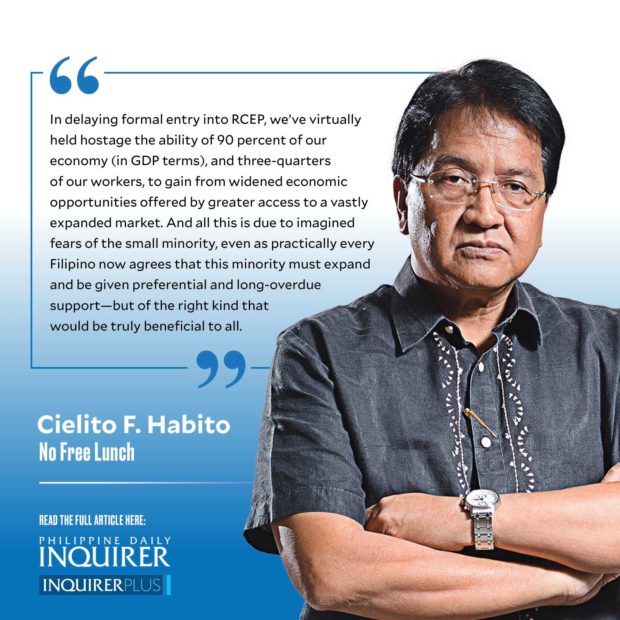RCEP myths and mix-ups
The Philippines will soon ratify the Regional Comprehensive Economic Partnership (RCEP) Agreement,” Nikkei Asia quoted President Marcos Jr. as having stated before Japanese business leaders in Tokyo last week. The RCEP train had already left over a year ago, and here we are, still arguing over whether or when we should get on it.
Can one count on the President’s word even as his elder sister, who chairs the Senate foreign relations committee that initiates any such ratification, has repeatedly announced refusal to lead the ratification effort? The only way it can proceed is for the Senate president to bring it directly to a plenary vote, and he has reportedly pledged to deliver the ratified RCEP before Holy Week (which is early April).
Our neighbors have already begun exploiting the wide new economic opportunities the agreement brings, but we still see domestic debates on the topic being muddled by confused arguments, with both sides accusing the other of peddling myths. My position on RCEP has always been clear, and I comment here on myths and mixed-up claims persistently cited against it, despite having long been disputed.
“RCEP poses dangers to agriculture,” they say, and “it will lead to a sudden flood of farm imports.” The Department of Trade and Industry and Department of Agriculture have repeatedly clarified and explained that levels of protection for our farm products remain unchanged under RCEP, at least until many years from now. Our RCEP negotiators assure that they made it a point to preserve the status quo for farm products in our various existing trade agreements. And RCEP actually widens opportunities to sell farm products to its other members—but we must shape up to take advantage of these new (and long-standing) opportunities. The “sudden flood” argument thus cannot hold water (pardon the pun). Should imports increase, it could not be due to RCEP but other forces, especially self-inflicted sins of omission that stunt our farm and fisheries sector.
RCEP oppositors claim to have “debunked” the “myth” that “farmers and fisherfolk have been getting too much protection.” There is some confusion here. What economists have constantly pointed out is that agriculture has had too much trade protection (the missing word “trade” makes a lot of difference). This is no myth, but a demonstrable fact. It seems that too many are mixing up “protection” with “support.” The latter should have been government’s focus all these years, and there’s no debate it has miserably failed in that, offering trade protection instead. In so doing, it penalized the much wider mass of consumers in the process, especially poor ones, thereby harming their food security.
The real myth, often mouthed by left-leaning anti-trade critics, is that “unbridled liberalization” due to the World Trade Organization (WTO) battered our farmers. On the contrary, as we entered the WTO, Asean Free Trade Area, and other trade agreements, we consistently bridled farm trade by invoking exceptions, waivers, and high tariff rates for “sensitive” products especially rice, corn, sugar, and vegetables. While meant to be time-bound, we kept extending these for decades.
Government took control of trade as if it had the eminent wisdom to “play god” and ensure timely supplies to match market demands, in the process enabling a limited group of “cartelistic” traders. Yet this is better left to an unrestricted market where competing (non-collusive) traders directly suffer the consequences of bad import decisions—unlike government bureaucrats who don’t. It should be no surprise that our most costly and troubled commodities now are those same products government “protected” or controlled trade in over many years.
In delaying formal entry into RCEP, we’ve virtually held hostage the ability of 90 percent of our economy (in GDP terms), and three-quarters of our workers, to gain from widened economic opportunities offered by greater access to a vastly expanded market. And all this is due to imagined fears of the small minority, even as practically every Filipino now agrees that this minority must expand and be given preferential and long-overdue support—but of the right kind that would be truly beneficial to all.
—————–
cielito.habito@gmail.com





















